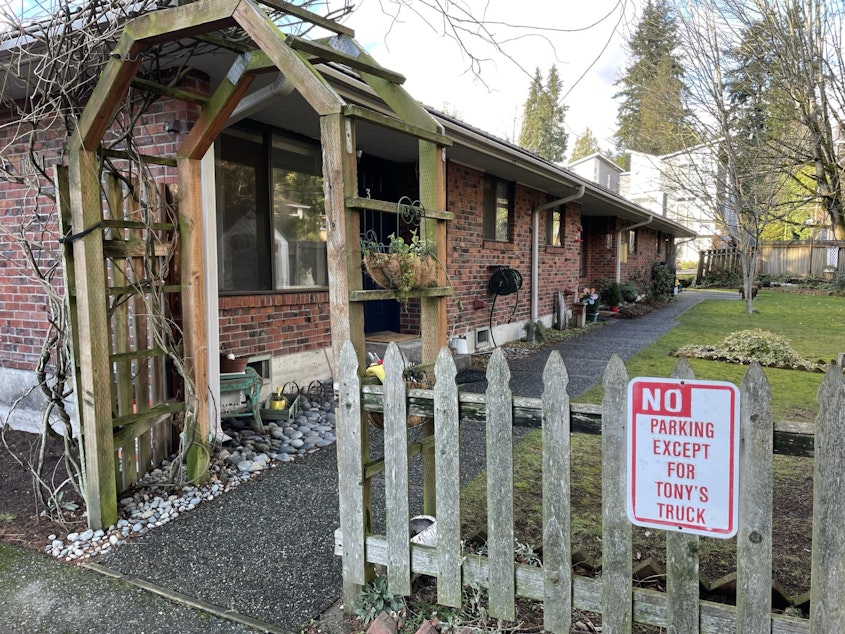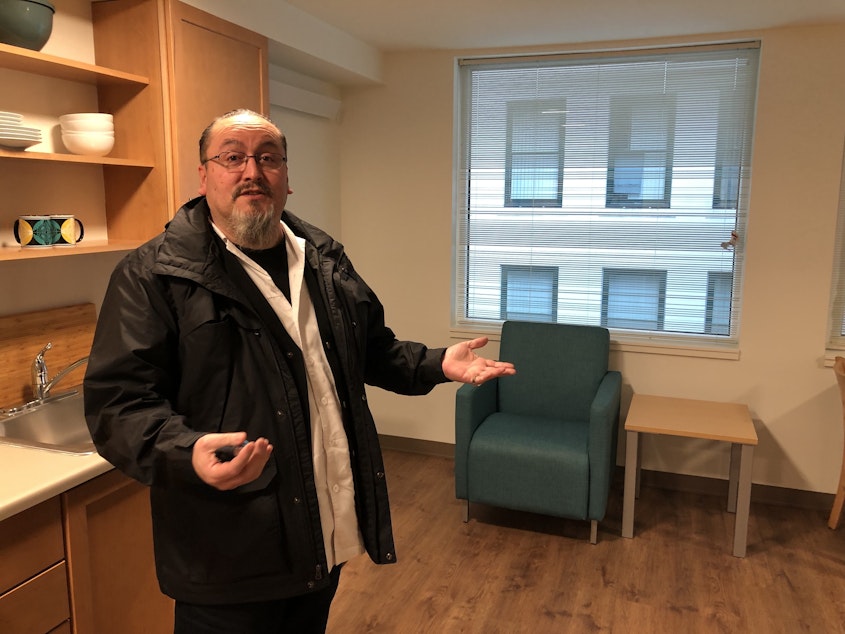Politically-risky solutions to our housing woes: Today So Far

Washington state needs more housing, including affordable options, and ways to fit denser development in popular communities. But solutions to this need are not easy to come by, and could be politically risky for elected officials.
This post originally appeared in KUOW's Today So Far newsletter for Feb. 8, 2022.
On one hand: our region needs more housing and affordable options at that. On the other hand: new development can disrupt the vibe of a community that may have taken decades to establish. And the battleground for much of this debate is happening in Washington's single-family zones.
Take Edmonds, for example, where preserving single-family zoning has become a political issue. As one resident recently told KUOW's Joshua McNichols: "Yeah, sorry – I’m gonna be selfish. Part of the reason I moved here was because of the way it is now."
It's a situation where both perspectives could be a little correct. I fully understand what that person told Joshua — I too walk single family streets and marvel at the ambiance. I don't want that to go away either. But at the same time, I skeptically wonder if I'll ever live in one of those homes myself (in a region where people are dropping $500,000 cash over asking prices). A Renton-based real estate broker recently told KUOW that houses have dramatically jumped in value, and part of the problem is that there are mostly just single-family homes for sale (and at limited supply).
Is there a middle ground on this issue? That's currently being debated in Olympia, where a HB 1782 is working its way through committees. It aims to open up "middle housing" in traditionally single-family zones. This means duplexes, triplexes, and more. The goal is to create denser housing options which could be more affordable.
I can already hear the arguments emerging, so allow me to offer some food for thought. I'll reiterate my argument that if developers put some effort into the appearance of these dwellings (avoided eye sores sticking out from the cozy Northwest neighborhood ambiance), then maybe people wouldn't object to them so much. Just one idea. Take a walk through Bothell for some good examples.
Sponsored
Cities have design review boards that guide the aesthetic of a community, and they are often ignored. But it's here where decisions are made about that project next door. They're also a gateway into local design guidelines. These boards are why there are no overwhelmingly, brightly-lit store signs in downtown Winslow on Bainbridge Island. They're also how Leavenworth maintains its Bavarian appeal. Seattle has a design review board, too, that weighs in on multifamily and commercial buildings. I'm just going to leave that fact right there for you...
But back to HB 1782. It had a companion bill in the Senate that did not survive its committee this week, indicating that this issue will be hotly debated and that the House bill is likely to go through a lot of compromises. That negotiation will happen with lawmakers and local mayors, many of whom are hesitant to mess with their town's zoning codes. Despite an awareness of the need for more dense housing, supporting solutions like middle housing can be politically risky for elected officials, which is part of the reason why it's so hard to change rules around single-family zoning.
KUOW's Joshua McNichols helped with reporting for today's newsletter.
Have a comment or want to reach out to me? Send me an email at dyer@kuow.org.
AS SEEN ON KUOW
Sponsored

Derrick Belgarde with the Chief Seattle Club shows off new housing units in Pioneer Square. The club's new housing can accommodate 96 people, most of whom are Native Americans and Alaska Natives who have been experiencing homelessness. An average rent is about $250, subsidized with private and government funding. (Amy Radil / KUOW)
DID YOU KNOW?
When Black History Month comes around, it's inevitable that someone will mention George Washington Carver. And for good reason — he's pretty freakin' awesome! And not because of peanut butter. It would be difficult to list the immense influence of this man, especially on our agricultural industry. Henry Ford even sought him out to help develop fuel for cars (Ford felt fossil fuels were not a good idea).
A lot of us grew up thinking Carver invented peanut butter (or maybe you saw that Eddie Murphy sketch on SNL). But Carver never actually invented it (indigenous peoples had figured out peanut butter a long time ago). His contributions are arguably much greater. His research found that continuous cotton farming had destroyed soil and lessened cotton yields. So he developed a method of crop rotation that used sweet potatoes, peanuts, and soybeans. That not only brought back U.S. cotton yields, but also gave the country a surplus of food, particularly peanuts and sweet potatoes. Because of that surplus, Carver invented everything from new flours to paint and writing ink. He developed more than 300 uses for peanuts that spanned food, commercial products, and medicines. And that's just one corner of his research.
Sponsored
Carver's profile was greatly raised through his scientific endeavors. He would eventually meet with Presidents Theodore Roosevelt, Calvin Coolidge, and FDR. The Prince of Sweden once came to study with him for three weeks. He even traveled to India to help discuss nutritional needs with Mahatma Gandhi. After he died, FDR signed legislation establishing a national monument for Carver, something that had only been done for presidents.
ALSO ON OUR MINDS

Top White House science adviser announces resignation after reports of bullying
Eric Lander, a science adviser to President Biden and director of the White House Office of Science and Technology Policy, has submitted a letter of resignation, after an internal White House investigation concluded that he bullied and demeaned his subordinates and violated the White House's workplace policy.

